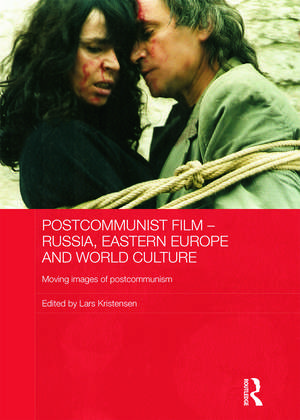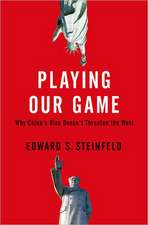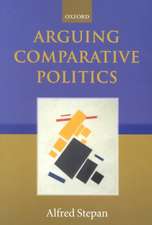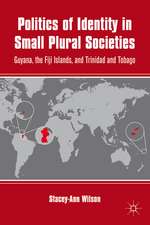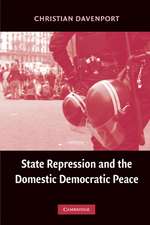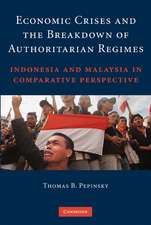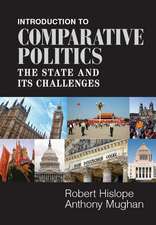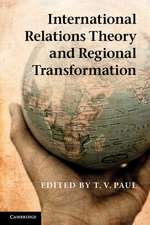Postcommunist Film - Russia, Eastern Europe and World Culture: Moving Images of Postcommunism: Routledge Contemporary Russia and Eastern Europe Series
Editat de Lars Kristensenen Limba Engleză Hardback – 26 mar 2012
The book examines different national cinemas and dissimilar cinematic modes - from Russian blockbuster cinema to Chinese independent cinema; from Serbian city films to revolutionary films of Mozambique - all formulated as within the postcommunist condition. It considers the postcommunist film in terms of transnational and World cinema. It covers a wide range of films from small and independent filmmaking to mainstream, popular cinema, and explains post-communist signifiers as manifested in visual culture both inside and outside former, and current, communist countries.
Din seria Routledge Contemporary Russia and Eastern Europe Series
-
 Preț: 326.15 lei
Preț: 326.15 lei -
 Preț: 325.21 lei
Preț: 325.21 lei -
 Preț: 326.49 lei
Preț: 326.49 lei -
 Preț: 309.79 lei
Preț: 309.79 lei -
 Preț: 321.03 lei
Preț: 321.03 lei -
 Preț: 326.56 lei
Preț: 326.56 lei - 9%
 Preț: 934.69 lei
Preț: 934.69 lei -
 Preț: 302.32 lei
Preț: 302.32 lei -
 Preț: 318.10 lei
Preț: 318.10 lei -
 Preț: 379.30 lei
Preț: 379.30 lei - 25%
 Preț: 824.70 lei
Preț: 824.70 lei - 18%
 Preț: 1111.51 lei
Preț: 1111.51 lei - 18%
 Preț: 950.71 lei
Preț: 950.71 lei -
 Preț: 464.54 lei
Preț: 464.54 lei - 18%
 Preț: 1168.76 lei
Preț: 1168.76 lei - 16%
 Preț: 130.54 lei
Preț: 130.54 lei - 26%
 Preț: 821.46 lei
Preț: 821.46 lei - 18%
 Preț: 1169.78 lei
Preț: 1169.78 lei -
 Preț: 413.98 lei
Preț: 413.98 lei -
 Preț: 387.49 lei
Preț: 387.49 lei -
 Preț: 396.90 lei
Preț: 396.90 lei - 18%
 Preț: 1059.93 lei
Preț: 1059.93 lei - 18%
 Preț: 1220.77 lei
Preț: 1220.77 lei -
 Preț: 418.13 lei
Preț: 418.13 lei - 18%
 Preț: 1057.57 lei
Preț: 1057.57 lei -
 Preț: 413.37 lei
Preț: 413.37 lei - 18%
 Preț: 707.96 lei
Preț: 707.96 lei - 18%
 Preț: 1058.65 lei
Preț: 1058.65 lei - 18%
 Preț: 948.84 lei
Preț: 948.84 lei - 18%
 Preț: 706.91 lei
Preț: 706.91 lei - 18%
 Preț: 1059.84 lei
Preț: 1059.84 lei -
 Preț: 488.33 lei
Preț: 488.33 lei - 18%
 Preț: 1056.28 lei
Preț: 1056.28 lei -
 Preț: 390.12 lei
Preț: 390.12 lei - 18%
 Preț: 1053.16 lei
Preț: 1053.16 lei - 18%
 Preț: 1056.28 lei
Preț: 1056.28 lei - 28%
 Preț: 850.91 lei
Preț: 850.91 lei - 18%
 Preț: 1171.89 lei
Preț: 1171.89 lei - 18%
 Preț: 1050.78 lei
Preț: 1050.78 lei - 18%
 Preț: 1166.68 lei
Preț: 1166.68 lei - 18%
 Preț: 1058.79 lei
Preț: 1058.79 lei - 18%
 Preț: 1958.23 lei
Preț: 1958.23 lei
Preț: 1058.79 lei
Preț vechi: 1291.21 lei
-18% Nou
Puncte Express: 1588
Preț estimativ în valută:
202.59€ • 211.53$ • 167.68£
202.59€ • 211.53$ • 167.68£
Carte tipărită la comandă
Livrare economică 05-19 aprilie
Preluare comenzi: 021 569.72.76
Specificații
ISBN-13: 9780415671644
ISBN-10: 0415671647
Pagini: 224
Ilustrații: 15 black & white halftones
Dimensiuni: 156 x 234 x 18 mm
Greutate: 0.57 kg
Ediția:1
Editura: Taylor & Francis
Colecția Routledge
Seria Routledge Contemporary Russia and Eastern Europe Series
Locul publicării:Oxford, United Kingdom
ISBN-10: 0415671647
Pagini: 224
Ilustrații: 15 black & white halftones
Dimensiuni: 156 x 234 x 18 mm
Greutate: 0.57 kg
Ediția:1
Editura: Taylor & Francis
Colecția Routledge
Seria Routledge Contemporary Russia and Eastern Europe Series
Locul publicării:Oxford, United Kingdom
Public țintă
PostgraduateCuprins
Part I: Cultural Strategies, Industry and Reception 1. The Russian Postcommunist Blockbuster: Fyodor Bondarchuk’s 9th Company 2. Baltic Cinema; Between National and Transnational Strategies 3. Cultural Aspirations and the Voluntary Americanisation of Serbian Cinema 4. ‘Haven’t you heard of Internationalism?’ Communist Cinema in Mozambique 5. The Remains of Socialist Realism: Cyclo and Beijing Bicycle 6. Spotting the Eagle on Anglophone Turf: Postcommunist Reception and Albanian Cinema Part II: People, Place and Nation 7. Demolish or Love: Representations of Socialist Leftover in Postcommunist Polish Cinema 8. Treading New Paths: Czech and German Postcommunist Road Movies 9. The Crime that Changed Serbia: The Belgrade Ghetto Film 10. Projected Nation and Projected Self: Atom Egoyan’s Calendar 11. Truancy, or Thought from the Provinces: On Jia Zhangke's Platform 12. Representations of Former USSR Identities in Turkish Cinema
Descriere
A postcommunist condition has arisen from the fall of the Berlin Wall and later the Soviet Empire: this book looks at how this condition has manifested itself globally in the production of post-communist film. It argues post-communism is a shared experience on a geopolitical level, unlimited by national state borders, and examines postcommunist cross culturalism and global totalitarianism within film.
